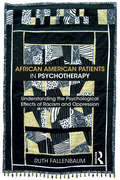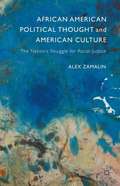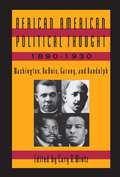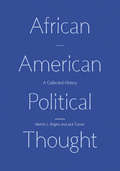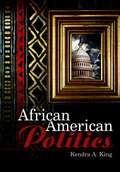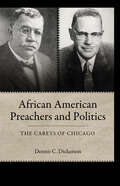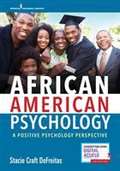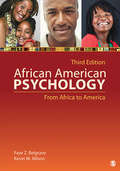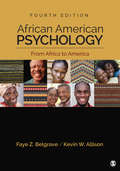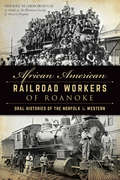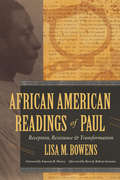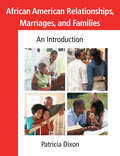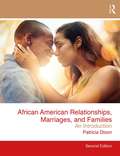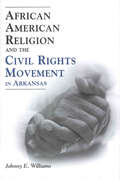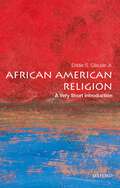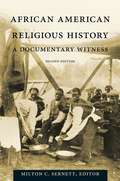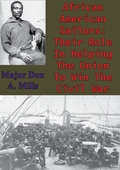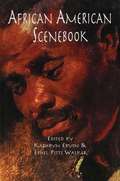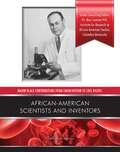- Table View
- List View
African American Patients in Psychotherapy: Understanding the Psychological Effects of Racism and Oppression
by Ruth FallenbaumAfrican American Patients in Psychotherapy integrates history, current events, arts, psychoanalytic thinking, and case studies to provide a model for understanding the social and historical dimensions of psychological development across African American communities. Among the topics included are psychological consequences of slavery and Jim Crow, the black patient and the white therapist, the toll of even “small” racist enactments, the black patient’s uneasy relationship with health care providers, and a revisiting of the idea of “black rage.” Author Ruth Fallenbaum also examines the psychological potential of reparation for centuries of slave labor and legalized wage and property theft.
African American Perspectives on Political Science
by Charles Hamilton Rich WilburRace matters in both national and international politics. Starting from this perspective, African American Perspectives on Political Science presents original essays from leading African American political scientists. Collectively, they evaluate the discipline, its subfields, the quality of race-related research, and omissions in the literature. They argue that because Americans do not fully understand the many-faceted issues of race in politics in their own country, they find it difficult to comprehend ethnic and racial disputes in other countries as well. In addition, partly because there are so few African Americans in the field, political science faces a danger of unconscious insularity in methodology and outlook. Contributors argue that the discipline needs multiple perspectives to prevent it from developing blind spots. Taken as a whole, these essays argue with great urgency that African American political scientists have a unique opportunity and a special responsibility to rethink the canon, the norms, and the directions of the discipline.
African American Pioneers of Sociology
by Peter Feldstein Pierre Saint-ArnaudIn African American Pioneers of Sociology, Pierre Saint-Arnaud examines the lasting contributions that African Americans have made to the field of sociology. Arguing that science is anything but a neutral construct, he defends the radical stances taken by early African American sociologists from accusations of intellectual infirmity by foregrounding the racist historical context of the time these influential works were produced. Examining key figures such as W.E.B. Du Bois, Edward Franklin Frazier, Charles Spurgeon Johnson, Horace Roscoe Cayton, J.G. St. Clair Drake, and Oliver Cromwell Cox, Saint-Arnaudreveals the ways in which many aspects of modern sociology emerged from these authors' radical views on race, gender, religion, and class. Beautifully translated from its original French, African American Pioneers of Sociology is a stunning examination of the influence of African American intellectuals and an essential work for understanding the origins of sociology as a modern discipline.
African American Political Thought and American Culture: The Nation's Struggle For Racial Justice
by Alex ZamalinThis book demonstrates how certain African American writers radically re-envisioned core American ideals in order to make them serviceable for racial justice. Each writer's unprecedented reconstruction of key American values has the potential to energize American citizenship today.
African American Political Thought, 1890-1930: Washington, Du Bois, Garvey and Randolph
by Cary D. WintzThis text presents a selection of essays and speeches written between 1890 and 1930 by Booker T. Washington, W.E.B. Du Bois, A. Philip Randolph and Marcus Garvey. The work analyses African-American political thought, defining the options confronting African Americans in the 20th century.
African American Political Thought: A Collected History
by Jack Turner Melvin L. RogersAfrican American Political Thought offers an unprecedented philosophical history of thinkers from the African American community and African diaspora who have addressed the central issues of political life: democracy, race, violence, liberation, solidarity, and mass political action. Melvin L. Rogers and Jack Turner have brought together leading scholars to reflect on individual intellectuals from the past four centuries, developing their list with an expansive approach to political expression. The collected essays consider such figures as Martin Delany, Ida B. Wells, W. E. B. Du Bois, James Baldwin, Toni Morrison, and Audre Lorde, whose works are addressed by scholars such as Farah Jasmin Griffin, Robert Gooding-Williams, Michael Dawson, Nick Bromell, Neil Roberts, and Lawrie Balfour. While African American political thought is inextricable from the historical movement of American political thought, this volume stresses the individuality of Black thinkers, the transnational and diasporic consciousness, and how individual speakers and writers draw on various traditions simultaneously to broaden our conception of African American political ideas. This landmark volume gives us the opportunity to tap into the myriad and nuanced political theories central to Black life. In doing so, African American Political Thought: A Collected History transforms how we understand the past and future of political thinking in the West.
African American Politics (Us Minority Politics #6)
by Kendra KingAfrican-American Politics is a cutting-edge introduction to the political successes, failures, and persistent challenges of African-American political participation in the United States. Exploring both historic and present day political phenomena, the book draws on a wide range of sources, including U.S. Census data, Gallup Polls, landmark court opinions, speeches and first-hand interviews to provide the reader with a comprehensive and up-to-the-minute analysis of what often appear to be "irreconcilable differences" between the American political system and one of its most historically subjugated constituency groups.
African American Preachers and Politics: The Careys of Chicago (Margaret Walker Alexander Series in African American Studies)
by Dennis C. DickersonDuring most of the twentieth century, Archibald J. Carey, Sr. (1868–1931) and Archibald J. Carey, Jr. (1908–1981), father and son, exemplified a blend of ministry and politics that many African American religious leaders pursued. Their sacred and secular concerns merged in efforts to improve the spiritual and material well-being of their congregations. But as political alliances became necessary, both wrestled with moral consequences and varied outcomes. Both were ministers to Chicago's largest African Methodist Episcopal Church congregations—the senior Carey as a bishop, and the junior Carey as a pastor and an attorney. Bishop Carey associated himself mainly with Chicago mayor William Hale Thompson, a Republican, whom he presented to black voters as an ally. When the mayor appointed Carey to the city's civil service commission, Carey helped in the hiring and promotion of local blacks. But alleged impropriety for selling jobs marred the bishop's tenure. The junior Carey, also a Republican and an alderman, became head of the panel on anti-discrimination in employment for the Eisenhower administration. He aided innumerable black federal employees. Although an influential benefactor of CORE and SCLC, Carey associated with notorious FBI director J. Edgar Hoover and compromised support for Martin Luther King, Jr. Both Careys believed politics offered clergy the best opportunities to empower the black population. Their imperfect alliances and mixed results, however, proved the complexity of combining the realms of spirituality and politics.
African American Psychology: A Positive Psychology Perspective
by Stacie DeFreitasThis innovative text is the first to examine the contemporary psychological experience of African Americans through the lens of a positive, strengths-based model. It combats the deficit perspective that has permeated the psychological literature about African Americans by focusing on the strengths that have facilitated their growth and resilience--while also considering existing challenges and struggles. The author examines in depth the major areas of psychological research across family, peer, and romantic relationships, education, work, ethnic-racial socialization and identity, prosocial behavior and civic engagement, and the mental and physical health of African Americans today. With a focus on real life applications, the text includes pedagogical elements introducing topics in Current Events, Interventions in Practice, Individual Issues, African Cultural Values, and Media and Technology. Additional features include learning objectives in each chapter, discussion questions, a closing summary, an extensive trove of additional resources, and PowerPoints and a sample syllabus for instructors. Print version of book includes free, searchable, digital access to the entire contents.
African American Psychology: From Africa to America
by Dr Faye Z. Belgrave Dr Kevin W. AllisonAfrican American Psychology: From Africa to America provides students with comprehensive coverage of African American psychology as a field. Authors Faye Z. Belgrave and Kevin W. Allison expertly convey the integration of African and American influences on the psychology of African Americans. They illustrate how this group’s contemporary values, beliefs, and behaviors are derived from African culture and translated by the cultural socialization experiences of African Americans in this country. The text provides examples of evidence-based practices for improving well-being among African American communities, and addresses key methodological and research issues that are relevant to conducting research in this field. Each chapter of the text further addresses a contemporary issue of African Americans and provides a critical analysis of literature and research on select topics.
African American Psychology: From Africa to America
by Faye Z. Belgrave Kevin W. AllisonAfrican American Psychology: From Africa to America, Fourth Edition provides comprehensive coverage of the field of African American psychology. Authors Faye Z. Belgrave and Kevin W. Allison skillfully convey the integration of African and American influences on the psychology of African Americans using a consistent theme throughout the text—the idea that understanding the psychology of African Americans is closely linked to understanding what is happening in the institutional systems in the United States. The Fourth Edition reflects notable advances and important developments in the field over the last several years, and includes evidence-based practices for improving the overall well-being of African American communities. New to the Fourth Edition Coverage of current issues affecting African Americans and causing changes in the social-political environment include the Black Lives Matter movement, racial trauma, and more. Content from blogs has been added to chapter-opening cover stories to reflect the more modern ways news and information are obtained. More coverage of literature and research on Blacks throughout the diaspora, especially in Africa, provide historical context and documents heterogeneity among African Americans in the United States. Expanded coverage of topics as a result of recent research includes LGBTQ individuals, African American fathers, colorism, intersectionality, electronic cigarettes, social media, and more.
African American Psychology: From Africa to America
by Faye Z. Belgrave Kevin W. AllisonAfrican American Psychology: From Africa to America, Fourth Edition provides comprehensive coverage of the field of African American psychology. Authors Faye Z. Belgrave and Kevin W. Allison skillfully convey the integration of African and American influences on the psychology of African Americans using a consistent theme throughout the text—the idea that understanding the psychology of African Americans is closely linked to understanding what is happening in the institutional systems in the United States. The Fourth Edition reflects notable advances and important developments in the field over the last several years, and includes evidence-based practices for improving the overall well-being of African American communities. New to the Fourth Edition Coverage of current issues affecting African Americans and causing changes in the social-political environment include the Black Lives Matter movement, racial trauma, and more. Content from blogs has been added to chapter-opening cover stories to reflect the more modern ways news and information are obtained. More coverage of literature and research on Blacks throughout the diaspora, especially in Africa, provide historical context and documents heterogeneity among African Americans in the United States. Expanded coverage of topics as a result of recent research includes LGBTQ individuals, African American fathers, colorism, intersectionality, electronic cigarettes, social media, and more.
African American Railroad Workers of Roanoke: Oral Histories of the Norfolk & Western (American Heritage)
by Historical Society of Western Virginia Sheree ScarboroughRoanoke, Virginia, is one of America's great historic railroad centers. The Norfolk & Western Railway Company, now the Norfolk Southern Corporation, has been in Roanoke for over a century. Since the company has employed many of the city's African Americans, the two histories are intertwined. The lives of Roanoke's black railroad workers span the generations from Jim Crow segregation to the civil rights era to today's diverse corporate workforce. Older generations toiled through labor-intensive jobs such as janitors and track laborers, paving the way for younger African Americans to become engineers, conductors and executives. Join author Sheree Scarborough as she interviews Roanoke's African American railroad workers and chronicles stories that are a powerful testament of personal adversity, struggle and triumph on the rail.
African American Readings of Paul: Reception, Resistance, and Transformation
by Lisa M. BowensThe letters of Paul—especially the verse in Ephesians directing slaves to obey their masters—played an enormous role in promoting slavery and justifying it as a Christian practice. Yet despite this reality African Americans throughout history still utilized Paul extensively in their own work to protest and resist oppression, responding to his theology and teachings in numerous—often starkly divergent and liberative—ways. In the first book of its kind, Lisa Bowens takes a historical, theological, and biblical approach to explore interpretations of Paul within African American communities over the past few centuries. She surveys a wealth of primary sources from the early 1700s to the mid-twentieth century, including sermons, conversion stories, slave petitions, and autobiographies of ex-slaves, many of which introduce readers to previously unknown names in the history of New Testament interpretation. Along with their hermeneutical value, these texts also provide fresh documentation of Black religious life through wide swaths of American history. African American Readings of Paul promises to change the landscape of Pauline studies and fill an important gap in the rising field of reception history.
African American Readings of Paul: Reception, Resistance, and Transformation
by Lisa M. BowensThe letters of Paul—especially the verse in Ephesians directing slaves to obey their masters—played an enormous role in promoting slavery and justifying it as a Christian practice. Yet despite this reality African Americans throughout history still utilized Paul extensively in their own work to protest and resist oppression, responding to his theology and teachings in numerous—often starkly divergent and liberative—ways. In the first book of its kind, Lisa Bowens takes a historical, theological, and biblical approach to explore interpretations of Paul within African American communities over the past few centuries. She surveys a wealth of primary sources from the early 1700s to the mid-twentieth century, including sermons, conversion stories, slave petitions, and autobiographies of ex-slaves, many of which introduce readers to previously unknown names in the history of New Testament interpretation. Along with their hermeneutical value, these texts also provide fresh documentation of Black religious life through wide swaths of American history. African American Readings of Paul promises to change the landscape of Pauline studies and fill an important gap in the rising field of reception history.
African American Relationships, Marriages, and Families
by Patricia DixonAfrican American Relationships, Marriages, and Families is a historically and culturally centered text designed for relationship, marriage and family educators and therapists who work with African American singles and couples. Complete with numerous exercises, the book helps singles and couples increase their self-awareness, partner awareness and respect, and appreciation for difference. It also helps foster effective communication and conflict resolution skills, showing readers how to develop and maintain healthy relationships, marriages, and families. No ground is left uncovered in Dixon's thoughtful and considered analysis.
African American Relationships, Marriages, and Families: An Introduction
by Patricia DixonAfrican American Relationships, Marriages, and Families, Second Edition is a historically and culturally centered research-based text designed for use in undergraduate, graduate, and community-based courses on African American relationships, marriages, and families. Complete with numerous exercises, this volume can be used by current and future helping professionals to guide singles and couples by increasing single and partner-awareness, and respect and appreciation for difference. In addition, singles and couples learn skills for effective communication and conflict resolution and ultimately how to develop and maintain healthy relationships, marriages, and families. This second edition includes updates and revisions to current chapters and also features two new chapters: one on parenting and one on same-gender loving/LGBTQ.
African American Religion and the Civil Rights Movement in Arkansas (Margaret Walker Alexander Series in African American Studies)
by Johnny E. WilliamsWhat role did religion play in sparking the call for civil rights? Was the African American church a motivating force or a calming eddy? The conventional view among scholars of the period is that religion as a source for social activism was marginal, conservative, or pacifying. Not so, argues Johnny E. Williams. Focusing on the state of Arkansas as typical in the role of ecclesiastical activism, his book argues that black religion from the period of slavery through the era of segregation provided theological resources that motivated and sustained preachers and parishioners battling racial oppression. Drawing on interviews, speeches, case studies, literature, sociological surveys, and other sources, Williams persuasively defines the most ardent of civil rights activists in the state as products of church culture. Both religious beliefs and the African American church itself were essential in motivating blacks to act individually and collectively to confront their oppressors in Arkansas and throughout the South. Williams explains how the ideology of the black church roused disparate individuals into a community and how the church established a base for many diverse participants in the civil rights movement. He shows how church life and ecumenical education helped to sustain the protest of people with few resources and little permanent power. Williams argues that the church helped galvanize political action by bringing people together and creating social bonds even when societal conditions made action difficult and often dangerous. The church supplied its members with meanings, beliefs, relationships, and practices that served as resources to create a religious protest message of hope.
African American Religion: A Very Short Introduction
by Eddie S. Glaude Jr.Since the first African American denomination was established in Philadelphia in 1818, churches have gone beyond their role as spiritual guides in African American communities and have served as civic institutions, spaces for education, and sites for the cultivation of individuality and identities in the face of limited or non-existent freedom. In this Very Short Introduction, Eddie S. Glaude Jr. explores the history and circumstances of African American religion through three examples: conjure, African American Christianity, and African American Islam. He argues that the phrase "African American religion" is meaningful only insofar as it describes how through religion, African Americans have responded to oppressive conditions including slavery, Jim Crow apartheid, and the pervasive and institutionalized discrimination that exists today. This bold claim frames his interpretation of the historical record of the wide diversity of religious experiences in the African American community. He rejects the common tendency to racialize African American religious experiences as an inherent proclivity towards religiousness and instead focuses on how religious communities and experiences have developed in the African American community and the context in which these developments took place.
African American Religions, 1500–2000
by Sylvester A. JohnsonThis book provides a narrative historical, postcolonial account of African American religions. It examines the intersection of Black religion and colonialism over several centuries to explain the relationship between empire and democratic freedom. Rather than treating freedom and its others (colonialism, slavery and racism) as opposites, Sylvester A. Johnson interprets multiple periods of Black religious history to discern how Atlantic empires (particularly that of the United States) simultaneously enabled the emergence of particular forms of religious experience and freedom movements as well as disturbing patterns of violent domination. Johnson explains theories of matter and spirit that shaped early indigenous religious movements in Africa, Black political religion responding to the American racial state, the creation of Liberia, and FBI repression of Black religious movements in the twentieth century. By combining historical methods with theoretical analysis, Johnson explains the seeming contradictions that have shaped Black religions in the modern era.
African American Religious History: A Documentary Witness
by Milton C. SernettThis widely-heralded collection of remarkable documents offers a view of African American religious history from Africa and early America through Reconstruction to the rise of black nationalism, civil rights, and black theology of today. The documents--many of them rare, out-of-print, or difficult to find--include personal narratives, sermons, letters, protest pamphlets, early denominational histories, journalistic accounts, and theological statements. In this volume Olaudah Equiano describes Ibo religion. Lemuel Haynes gives a black Puritan's farewell. Nat Turner confesses. Jarena Lee becomes a female preacher among the African Methodists. Frederick Douglass discusses Christianity and slavery. Isaac Lane preaches among the freedmen. Nannie Helen Burroughs reports on the work of Baptist women. African Methodist bishops deliberate on the Great Migration. Bishop C. H. Mason tells of the Pentecostal experience. Mahalia Jackson recalls the glory of singing at the 1963 March on Washington. Martin Luther King, Jr. writes from the Birmingham jail. Originally published in 1985, this expanded second edition includes new sources on women, African missions, and the Great Migration. Milton C. Sernett provides a general introduction as well as historical context and comment for each document.
African American Religious Studies: An Interdisciplinary Anthology
by Gayraud WilmoreThis anthology provides a coherent, interdisciplinary theoretical base for students of African American religious studies and will assist in the design of programs and courses for lay theological education and training. To this end, the editor has assembled material from Old and New Testament studies, theology, church history, pastoral counseling, worship, and social action.
African American Sailors: Their Role In Helping The Union To Win The Civil War
by Major Don A. Mills Sr. USMCSince the very beginning of American history, African Americans have served alongside their white counterparts in virtually every major armed conflict on the high seas. This was especially true during the Civil War. The Union Navy continued to experience a shortage of available manpower to sufficiently man its fleet of 600 plus ships. Life aboard naval vessels was particularly harsh and naval recruiters did not hesitate to enlist African Americans, free and slave, to ensure sufficient manning.African American sailors saw their service as an opportunity to rise above the status of social discrimination and segregation. Because of the shortage of able-bodied seamen in the Union Navy, African Americans were encouraged to join the naval service at a time when the Army and Marine Corps excluded their service. In an effort to attract African American recruits and to have them reenlist when their terms expired, the Navy tended to treat African American sailors with some degree of equality and respect once at sea. African American sailors were messed and quartered alongside their white counterparts. Per the leadership of the ship's captain, segregation and discrimination were regulated or was less prevalent than in 19th century America.The accomplishments of the Union Navy had a significant impact on its winning the war. The Union Navy could not have achieved its mission without nearly one-fifth of its total manpower, the African American sailor. Their numbers provided the credible force required to execute the strategic aims of the Anaconda Plan and helped to ensure a Union victory. The service of African American sailors allowed the North to end the war much sooner than it would have without their service, thus preventing an even greater number of loss to human life.
African American Scenebook (Source Books on Education #57)
by Ethel Pitts-Walker Kathryn ErvinFirst Published in 1999. Routledge is an imprint of Taylor & Francis, an informa company.
African American Scientists and Inventors (Major Black Contributions from Emancipat)
by Tish DavidsonSome of them were elementary school dropouts. Others became medical doctors or college professors. Some were famous, while some toiled in obscurity. Some became rich. Others remained poor their whole lives. But the African-American scientists and inventors profiled in this book had one thing in common: a determination to succeed. And in pursuing their dreams, these creative thinkers made the world a better place. Lewis Latimer devised a manufacturing process that made electric lights affordable for ordinary people. Charles Drew did pioneering work in blood storage, helping save countless lives. Garrett Woods figured out how to send messages from moving trains. Learn about these and many other black scientists and inventors in this fascinating book.
